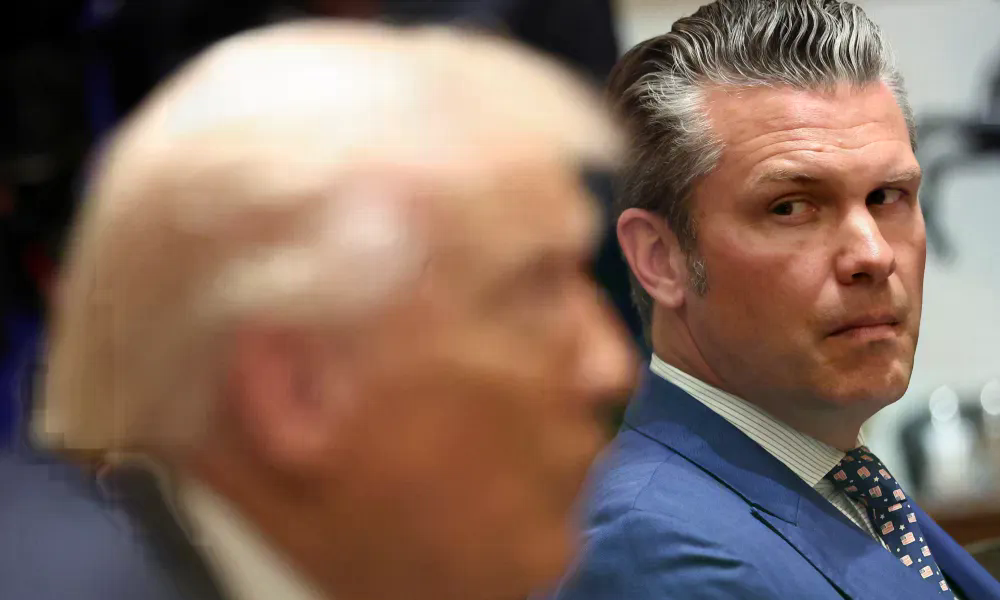
The United States has carried out its eighth military strike on a vessel suspected of transporting illicit drugs across international waters. This marks the first time such an attack has occurred in the Pacific Ocean rather than the Caribbean Sea.
Defense Secretary Pete Hegseth confirmed the strike on social media on Wednesday, stating that it took place the day before. In his post, he indicated that the operation was conducted at the direction of former President Donald Trump. He described the vessel as being operated by a “Designated Terrorist Organization” engaged in narco-trafficking in the Eastern Pacific. According to Hegseth, two individuals identified as “narco-terrorists” were aboard the ship and were killed during the strike.
A video shared with the post shows a missile striking a small blue boat, which then catches fire. The strike has raised concerns about the scope and legality of Trump’s military actions against Latin American drug cartels.
Despite these concerns, the Trump administration has defended the campaign as necessary to protect U.S. citizens from the influx of illicit drugs. It has characterized drug traffickers as enemy combatants, drawing parallels between them and groups like al-Qaeda. Hegseth echoed this sentiment in his statement, comparing the vessel’s occupants to armed adversaries who are waging war on the U.S. border.
Critics, however, argue that the attacks may violate both U.S. and international law, particularly regarding extrajudicial killings outside of recognized combat zones. They also question the justification for labeling non-state actors as terrorists. Brian Finucane, a researcher with the International Crisis Group, noted the distinction between alleged drug traffickers and groups like al-Qaeda, emphasizing that there has been no armed attack on U.S. soil akin to 9/11.
CBS News was among the first to report the strike, citing anonymous U.S. officials. Tuesday’s attack brings the confirmed death toll from Trump’s bombing campaign to 34, according to government statements.
The campaign began on September 2, when Trump announced a “kinetic strike” on a small boat traveling through international waters. Eleven people were killed in that attack, though their identities and evidence of their involvement were not disclosed. Trump accused the passengers of being linked to the Venezuelan gang Tren de Aragua, despite lacking proof.
Subsequent strikes followed, including one in the Caribbean on September 15, killing three, and another on September 19, also resulting in three deaths. The attacks continued into October, with four more fatalities on October 3 and six on October 14.
The seventh strike deviated from the administration’s usual pattern of announcing attacks. Instead of using social media to share grainy footage, the news was first reported by U.S. media, revealing that two survivors had been taken from the scene. The Trump administration later confirmed the attack, describing the victims as part of a “very large DRUG-CARRYING SUBMARINE.” Two additional individuals were killed in the incident.
On October 17, the seventh known strike targeted a vessel carrying members of the National Liberation Army (ELN), a Colombian rebel group. Previous vessels had largely been associated with Venezuela, where President Nicolas Maduro has maintained a tense relationship with the U.S.
The ongoing series of attacks has drawn criticism from various quarters, including leaders in Latin America. Mexican President Claudia Sheinbaum sought to reassure her country that the U.S. would not conduct military operations on Mexican soil. However, Trump has expressed openness to land-based operations, suggesting that efforts to stop drug trafficking would include targeting routes through land as well as sea.
Trump has also authorized the CIA to conduct covert operations in Venezuela, citing the need to combat drug trafficking. A memo reportedly sent to Congress described the alleged traffickers as “unlawful combatants” in a “non-international armed conflict.”
The lack of transparency surrounding the strikes has fueled speculation about the identities of those aboard and whether they were indeed involved in drug-related activities. In Trinidad and Tobago, a family claimed that a fisherman was killed in one of the attacks. Similarly, Colombian President Gustavo Petro asserted that a citizen, Alejandro Carranza, was among the dead, emphasizing that he had no ties to drug trafficking.
In response, the U.N. experts called for an immediate halt to the bombings, stating that the use of lethal force in international waters without a legal basis violates international law. They warned against repeating the history of external interventions in Latin America.


